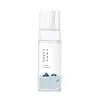What's inside
What's inside
 Key Ingredients
Key Ingredients

No key ingredients
 Benefits
Benefits

 Concerns
Concerns

 Ingredients Side-by-side
Ingredients Side-by-side

Water
Skin ConditioningDisodium Cocoyl Glutamate
CleansingGlycerin
HumectantCoco-Glucoside
CleansingDisodium Cocoamphodiacetate
CleansingLauryl Glucoside
CleansingMethylpropanediol
SolventButylene Glycol
HumectantSea Water
HumectantHyaluronic Acid
HumectantHydrolyzed Hyaluronic Acid
HumectantSodium Hyaluronate
HumectantDecyl Glucoside
CleansingSalix Alba Bark Extract
AstringentCamellia Sinensis Leaf Extract
AntimicrobialCentella Asiatica Leaf Extract
Skin ConditioningPinus Densiflora Leaf Extract
AntimicrobialCitrus Aurantium Bergamia Leaf Extract
AstringentCoffea Arabica Seed Extract
MaskingCladosiphon Okamuranus Extract
Skin ConditioningDipotassium Glycyrrhizate
HumectantPanthenol
Skin ConditioningAllantoin
Skin ConditioningSalicylic Acid
MaskingEthylhexylglycerin
Skin ConditioningSodium Chloride
MaskingCaprylyl Glycol
EmollientEthoxydiglycol
HumectantGlyceryl Caprylate
EmollientQuillaja Saponaria Bark Extract
CleansingPolyglyceryl-10 Myristate
Skin ConditioningSodium Citrate
BufferingDipropylene Glycol
HumectantPolyglyceryl-10 Laurate
Skin ConditioningSodium Cocoyl Isethionate
CleansingGlycereth-26
HumectantPropanediol
SolventSodium Phytate
1,2-Hexanediol
Skin ConditioningCitric Acid
Buffering2,3-Butanediol
HumectantWater, Disodium Cocoyl Glutamate, Glycerin, Coco-Glucoside, Disodium Cocoamphodiacetate, Lauryl Glucoside, Methylpropanediol, Butylene Glycol, Sea Water, Hyaluronic Acid, Hydrolyzed Hyaluronic Acid, Sodium Hyaluronate, Decyl Glucoside, Salix Alba Bark Extract, Camellia Sinensis Leaf Extract, Centella Asiatica Leaf Extract, Pinus Densiflora Leaf Extract, Citrus Aurantium Bergamia Leaf Extract, Coffea Arabica Seed Extract, Cladosiphon Okamuranus Extract, Dipotassium Glycyrrhizate, Panthenol, Allantoin, Salicylic Acid, Ethylhexylglycerin, Sodium Chloride, Caprylyl Glycol, Ethoxydiglycol, Glyceryl Caprylate, Quillaja Saponaria Bark Extract, Polyglyceryl-10 Myristate, Sodium Citrate, Dipropylene Glycol, Polyglyceryl-10 Laurate, Sodium Cocoyl Isethionate, Glycereth-26, Propanediol, Sodium Phytate, 1,2-Hexanediol, Citric Acid, 2,3-Butanediol
Water
Skin ConditioningGlycerin
HumectantHydrogenated Palm Acid 25%
Potassium Hydroxide
BufferingPotassium Cocoate 2.9%
EmulsifyingCalamine
AbsorbentGrass-Hay Herb Extract
PerfumingBentonite
AbsorbentGlyceryl Stearate
EmollientButylene Glycol
HumectantPolyquaternium-7
Acrylates/C10-30 Alkyl Acrylate Crosspolymer
Emulsion StabilisingSodium Phytate
EDTA
Sodium Benzoate
MaskingParfum
MaskingCI 14700
Cosmetic Colorant
 Reviews
Reviews

Ingredients Explained
These ingredients are found in both products.
Ingredients higher up in an ingredient list are typically present in a larger amount.
Butylene Glycol (or BG) is used within cosmetic products for a few different reasons:
Overall, Butylene Glycol is a safe and well-rounded ingredient that works well with other ingredients.
Though this ingredient works well with most skin types, some people with sensitive skin may experience a reaction such as allergic rashes, closed comedones, or itchiness.
Learn more about Butylene GlycolGlycerin is already naturally found in your skin. It helps moisturize and protect your skin.
A study from 2016 found glycerin to be more effective as a humectant than AHAs and hyaluronic acid.
As a humectant, it helps the skin stay hydrated by pulling moisture to your skin. The low molecular weight of glycerin allows it to pull moisture into the deeper layers of your skin.
Hydrated skin improves your skin barrier; Your skin barrier helps protect against irritants and bacteria.
Glycerin has also been found to have antimicrobial and antiviral properties. Due to these properties, glycerin is often used in wound and burn treatments.
In cosmetics, glycerin is usually derived from plants such as soybean or palm. However, it can also be sourced from animals, such as tallow or animal fat.
This ingredient is organic, colorless, odorless, and non-toxic.
Glycerin is the name for this ingredient in American English. British English uses Glycerol/Glycerine.
Learn more about GlycerinSodium Phytate is the synthetic salt form of phytic acid. Phytic acid is an antioxidant and can be found in plant seeds.
Sodium Phytate is a chelating agent. Chelating agents help prevent metals from binding to water. This helps stabilize the ingredients and the product.
Water. It's the most common cosmetic ingredient of all. You'll usually see it at the top of ingredient lists, meaning that it makes up the largest part of the product.
So why is it so popular? Water most often acts as a solvent - this means that it helps dissolve other ingredients into the formulation.
You'll also recognize water as that liquid we all need to stay alive. If you see this, drink a glass of water. Stay hydrated!
Learn more about Water